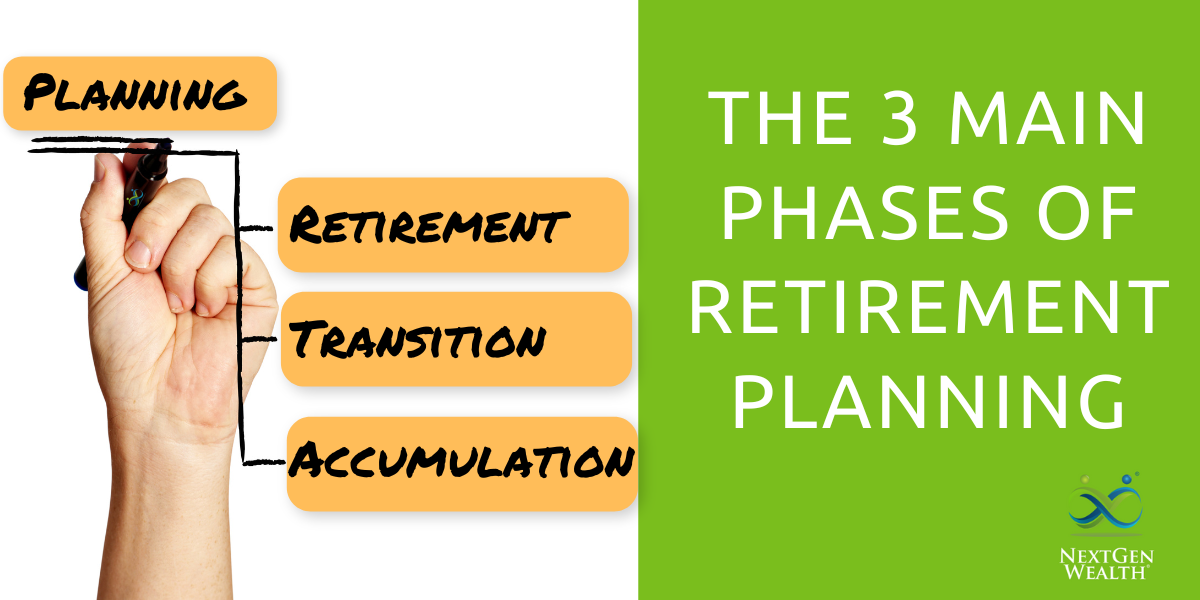The 3 Main Phases of Retirement Planning

This post was last updated on January 10, 2025, to reflect all updated information and best serve your needs.
There are three main phases of retirement planning: accumulation, transition, and decumulation (retirement). Depending on which you’re in, you’ll need to focus on different aspects of your financial life. The advice and expertise you’ll need will also be different as you move through these phases.
Someone who’s in the accumulation phase will need to focus on eliminating risks preventing the buildup of retirement assets and income streams. The transition phase bridges the gap between accumulation and decumulation. As you move into the decumulation/retirement phase, many changes happen.
Table of Contents
Phases Matter
What phase you’re in might not seem very important. It is. If you were building a house, you would engage different professionals for each phase of construction. A contractor specializing in building a foundation could probably build the whole house, but that’s not their specialty.
Building a home starts with accumulating a down payment, land, and materials to build the house. You’ll lay the groundwork, get a solid foundation, and get ready to build. This represents what’s probably years of preparation to build the house you always dreamed of.
As you continue building your house, you’ll build the walls and roof. Then you’ll transition to finishing everything out. You’ll engage with interior designers, finish carpenters, and other professionals to lay the groundwork for how you’ll use the house.
Finally, it’s time to start living in your retirement home. Maintenance and protection of what you’ve built become much more important. Landscapers, insurance agents, security professionals, and plumbers will help keep everything safe and in tip top shape from problems down the road.
Once again, every professional along the way has their specialty and their own place in the process. There will be overlap. Services like insurance, electricity, and financial institutions are needed throughout. However, the most amazing results often come from professionals who specialize in just one or two areas.
The Accumulation Phase
When it comes to building your retirement, the accumulation phase is one of the longer ones. Accumulation (hopefully) starts early in your working career and builds until you’re ready to step into retirement. Keep investing in your 401k, IRA, and let your investments grow.
You'll need to plan for many really important factors. The biggest risks you face in the accumulation phase are death, disability, divorce, and unemployment. Most of these are something you have limited control over. However, there are ways to reduce these risks.
Having proper life insurance and disability coverage is critical in the accumulation phase. If the primary wage earner in the house dies or becomes disabled, you may never accumulate enough money to retire comfortably. Ensure you have enough coverage.
Divorce and unemployment aren’t completely out of your control, but you’re only half of the equation. These aren’t necessarily something you can just insure away either. Prenuptial agreements can help keep order in the case of divorce, but they can’t prevent it from happening.
Unemployment just happens sometimes. Despite our best efforts, we’re often forced to pivot and change career paths. Life happens, so rolling with the punches is an important skill.
How to Accumulate
Besides the risks associated with the accumulation phase, you’ll want to really pay attention to how you accumulate wealth for the future. Decisions on Roth or not to Roth, investing in real estate, or understanding stock options may all be factors.
As an example, if all of your retirement assets are in a traditional IRA or 401k, you may run into issues with required minimum distributions (RMDs) later on. Strategies like a backdoor Roth conversion may also be needed as you build wealth.
You might even be at a crossroads with a job and need to evaluate whether the overall benefits of one job are better than another job. Knowing which account types are best and calculating how much you need to be saving are key in this phase of life.
Family Changes Might Take Over
Another thing to consider is the way your family life may change during your accumulation phase. Sometimes adding one child turns into two (or more) children – twins or triplets anyone? Maybe you got married sooner (or later) than you thought.
These types of changes and transitions can require significant shifts – personally and financially.
The Transition Phase
Here’s where your retirement goals and lifestyle really start to take shape. At this point, you’ve accumulated most, if not all, the assets you’ll need in retirement. Now you need help sorting through a big pile of choices about when and how to enter retirement.
How to Tell if You’re Entering the Transition Phase
Usually, people in the transition phase are about 5 years away from retirement and have accumulated a significant amount of retirement funds - usually $750,000 or more. At this point, you’ll determine if you can live off what you’ve saved. If yes, then you should be able to walk away from work any time now.
Many people won’t have a pension, but if you do, you’ll probably be nearing eligibility to draw as well. Many pensions require a certain time period of employment and/or a certain age you need to reach. Once you’re within a few years of being eligible, you’re probably in the transition phase.
When Can You Retire?
There isn’t necessarily a specific age you must be to retire. However, most people are typically in their upper 50’s or 60’s when they start the transition to retirement. Keep in mind, you need to be emotionally and financially ready to retire.
Adjustments to Your Lifestyle
As you transition into retirement, you’ll require many adjustments as you redefine what life will look like in retirement. You’ll need to determine what you’re retiring to, not just what you’re retiring from. Clint’s book, Retirement the Right Way, talks a lot about this incredibly important topic.
You want to uncover all the things you still feel you need to accomplish in life. You need to decipher what kind of legacy you want to leave. You want to define what a fulfilling life looks like moving forward.
Social Security Withdrawal Strategy
Another key decision in the transition phase is determining when to draw Social Security. Your Social Security withdrawal strategy can have a significant impact on your retirement income and quality of life. Except for rare instances, this is a permanent decision which requires careful consideration.
Correct Any “Mistakes” from the Accumulation Phase
In the transition phase, you’ll probably need to do some clean up from “mistakes” or missed opportunities during the accumulation phase. Life is messy and your financial life may not be any different. It might take some time to find all your old 401k documents, complete Roth conversions, and get everything set up for retirement.
There may even be some opportunities you didn’t know existed. It’s kind of like the saying, “can’t see the forest through the trees.” Just having a third party look over everything and ask the right questions can reveal a lot of opportunities you might have missed.
Leaving the Transition Phase
By the time you leave the transition phase and actually begin retirement, you’ll have everything in place so you can coast into retirement with little worry. We’ve handled all the heavy lifting. All the income sources are set. Now you just need to take the final step out of the office and into retirement.
Decumulation Phase – Retirement
Since all the heavy lifting from the accumulation and transition phases is over, the only thing left to do is enjoy retirement. Now you can focus on your quality of life and enjoy the fruits of your labor.
You’ll still need to implement the strategies developed in transition planning. There are still strategies to save money on taxes and other financial considerations too. However, you’ll be shifting gears. Instead of running pedal to the metal all the time, you can put things on cruise from here on out.
You’ll still have to make some choices about Medicare and long-term care, but there are fewer and fewer big decisions you need to dwell on. Life always throws us curveballs, but you can’t prevent those.
Estate and Legacy planning
In retirement you’ll continue to shape what your wishes for your estate will be. You’ll be putting the final touches on your legacy and spending more quality time with the people you love. This is the time to teach and guide others through the paths you once traveled.
Life will look a bit different in retirement, but it can (and should) be every bit as fulfilling as any other stage of your life. Some people focus on volunteering, charity, or just tending to their garden. Retirement is a great time for whatever activities bring you peace and contentment.
NextGen Wealth Specializes in the Transition into and Throughout Retirement
NextGen Wealth specializes in helping hardworking savers within 5 years of retirement. We work with people in the transition phase to step into retirement with confidence. This is why we typically work with folks who have accumulated $750,000 or more in assets.
If people haven’t accumulated a significant amount of assets, they’re probably still in the accumulation phase and not a good fit yet. Check out our Who We Serve page for a more detailed description of who we serve best. NextGen Wealth starts working with people as they transition into retirement and we stay with them throughout their journey.



